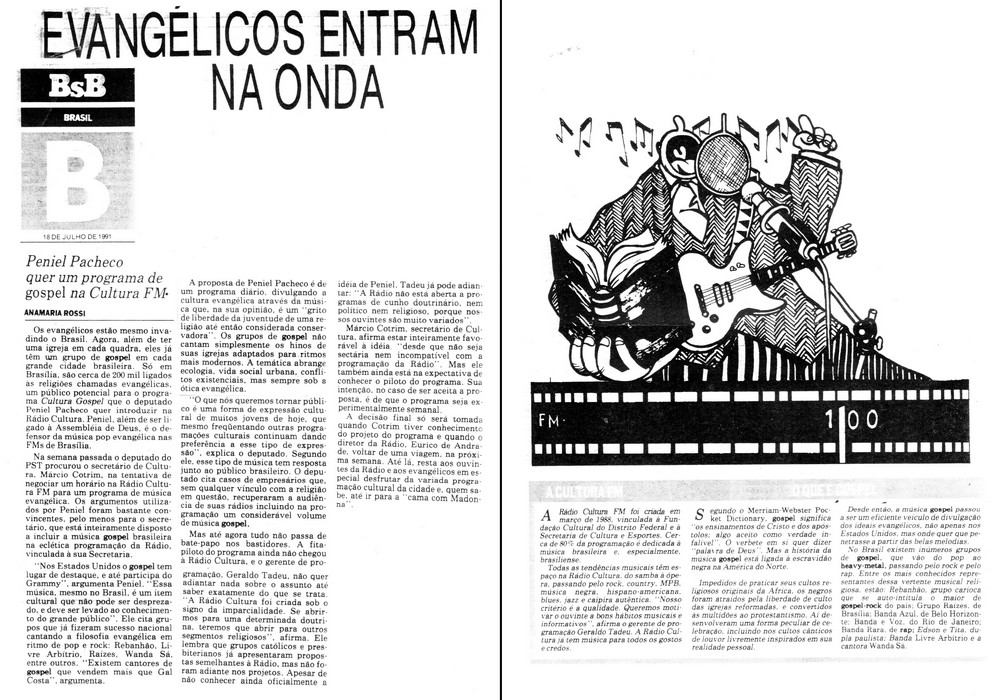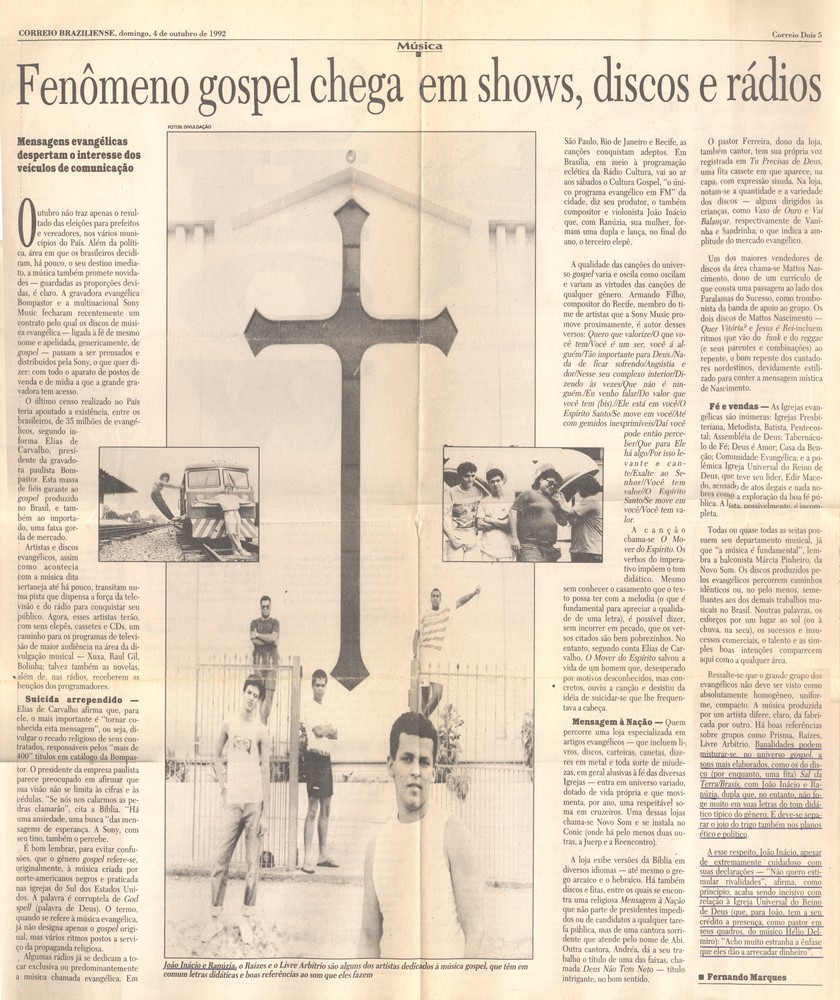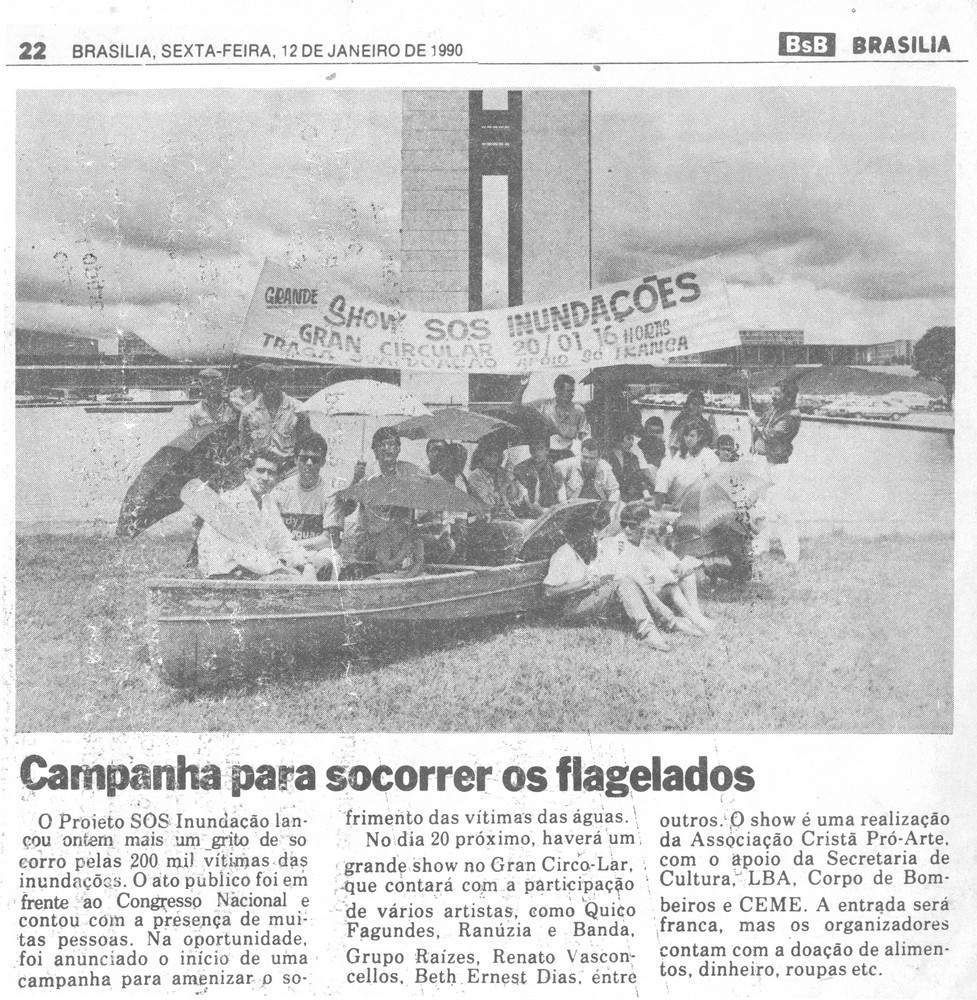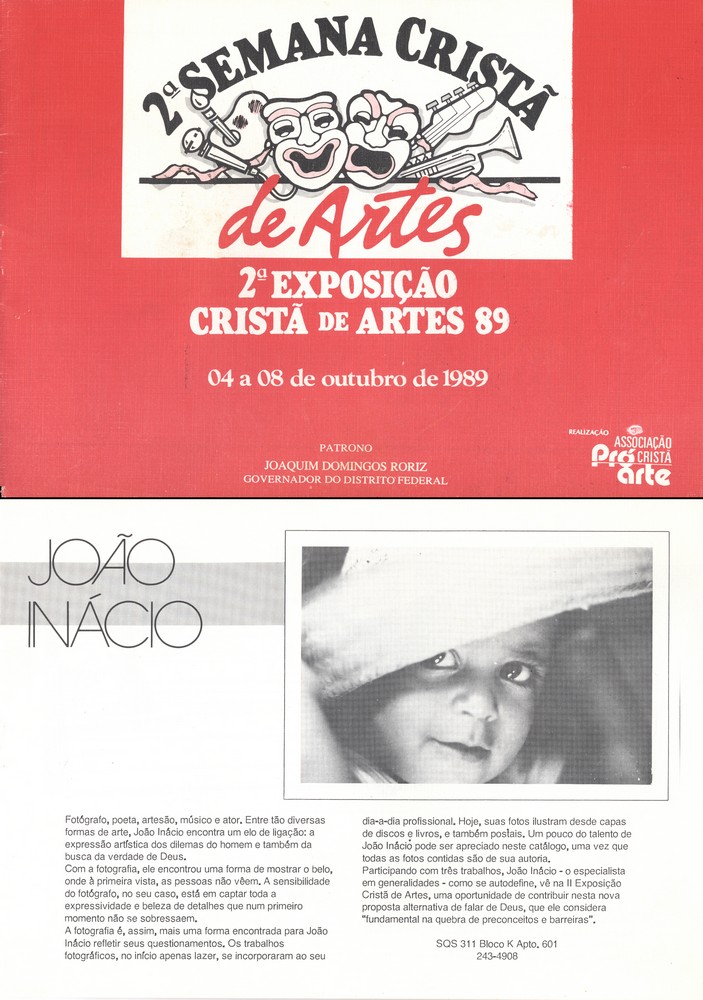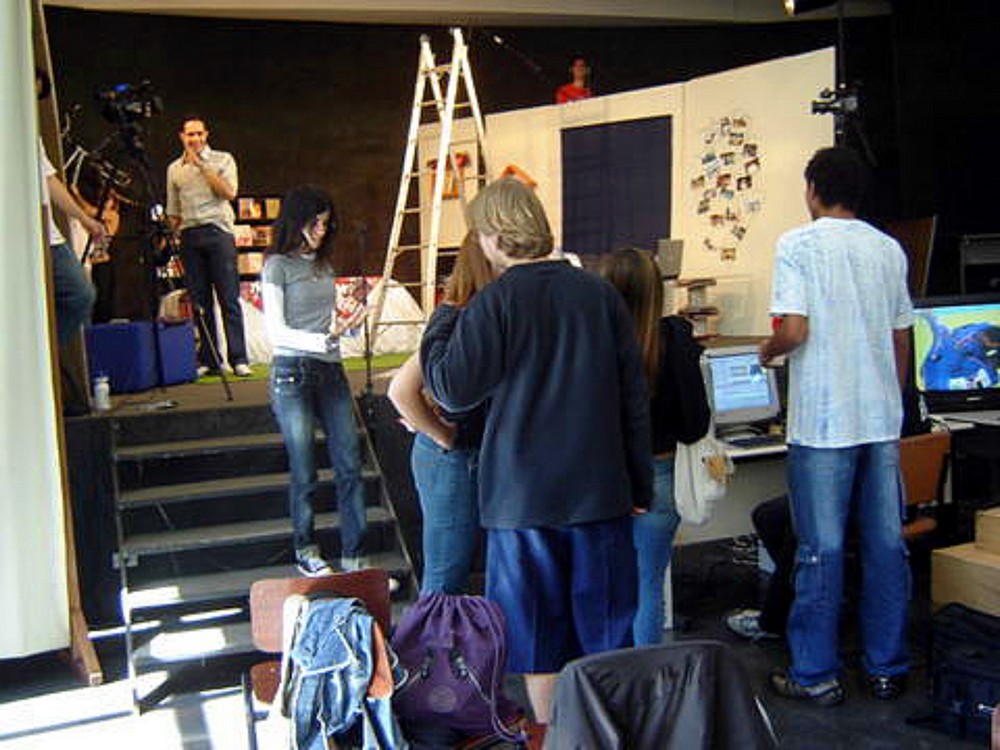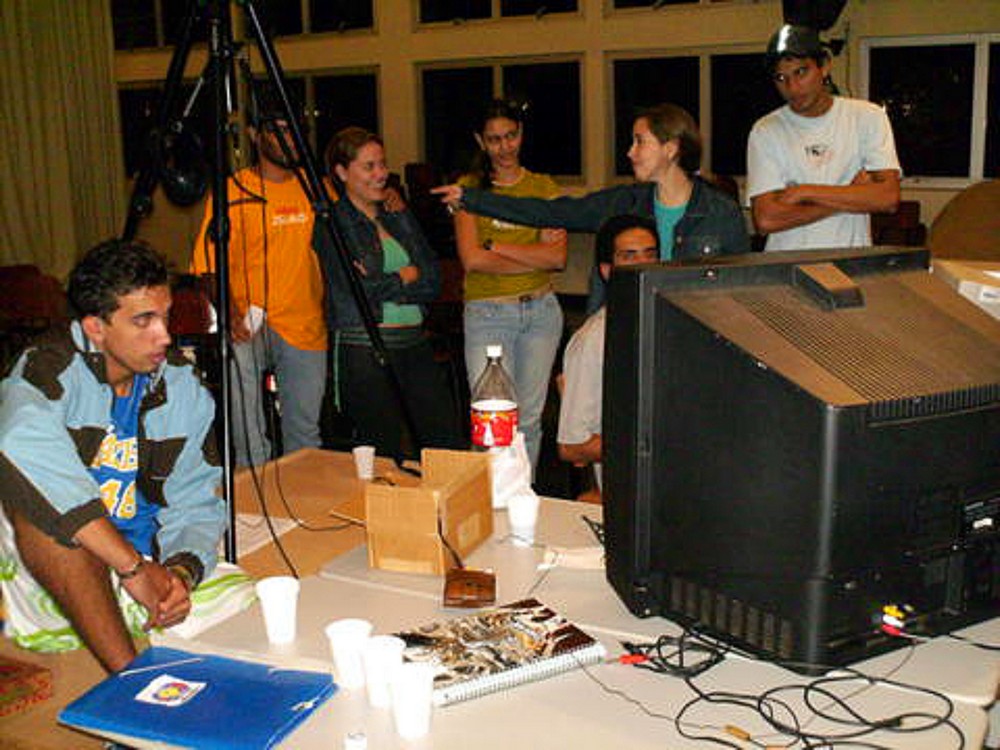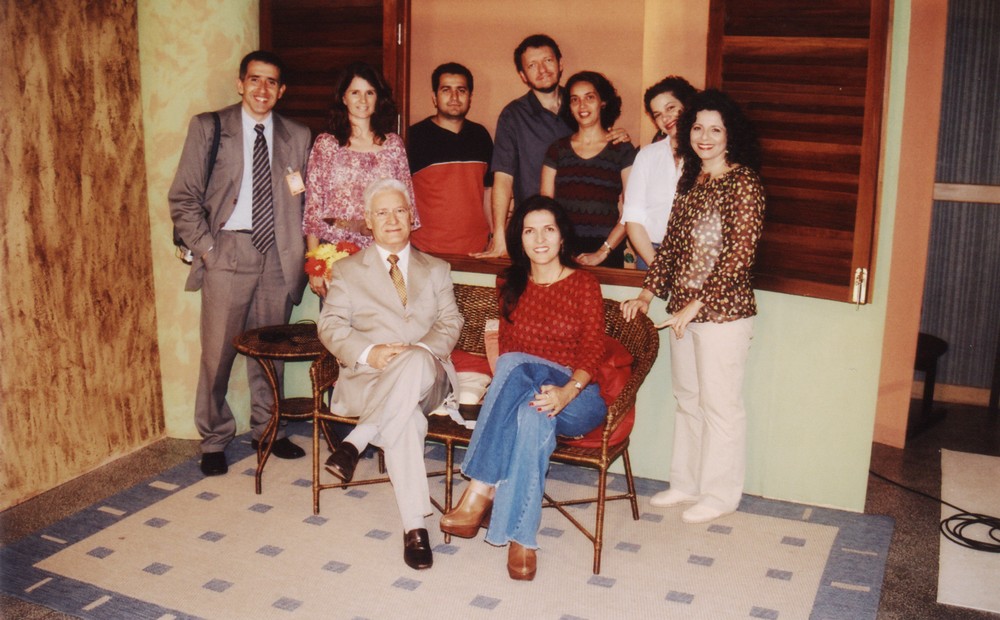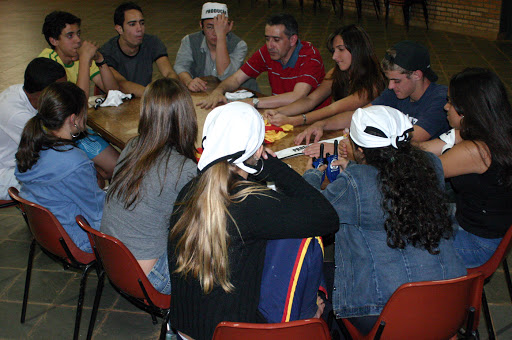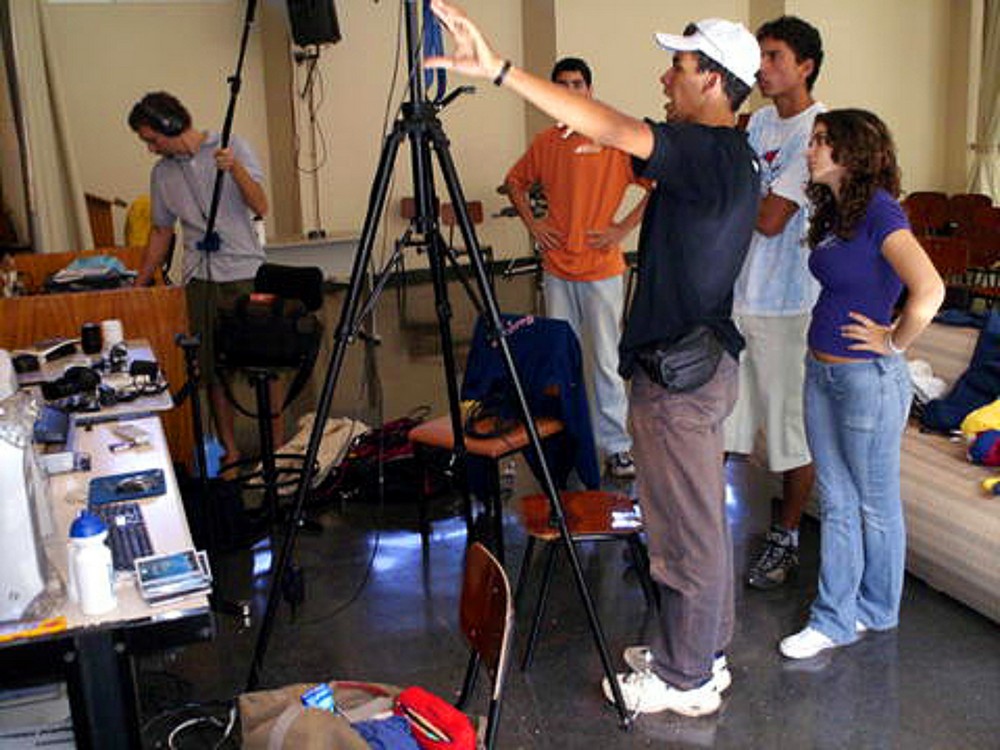Jingles Cultura Gospel
In 1989, the christian cultural scene in Brasilia was growing really fast, and somehow I was involved in almost everything. I took photos at the 2nd Christian Art Exposition, and Ranuzia and I were always invited to participate in the exhibitions and to play at various places.
At the following year, the Government of the Federal District created Cultura FM, a radio channel, and the politician Peniel Pacheco asked the governor to start a Christianity themed radio show. After the governor’s permission, Peniel invited the famous radio hosts Jairo Ribeiro and the musician Robertinho. In a informal conversation Robertinho called me to go along with him on one of the recording days and I went to the very first one. I continued to assist him for 11 years as his musical producer. Thanks to the persistence of the great radio host Jairo Ribeiro the show called Cultura Gospel was aired for 13 years.
A FM radio show that played christian songs was something very unusual. Only on Rio and on São Paulo there were something similar, but still always in radio channels owned by evangelicals. In a “secular” radio, as far as I knew, there was none other in the country. It was a weekly show, that aired on saturdays, at 7 am, and, although the bad scheduling, this show had the biggest audience of Radio Cultura. Do you have any idea of what it means to wake up at 7 am in a saturday justo to play music? National and international record labels sent albums to us. There was always this tension with the directors of the radio because the traditional listeners couldn’t conceive that a “cultural radio” could play christian music. I lost count of the times people called just to curse us or be mean or stuff like that. We always tried to be kind and gentle so that we hide our sadness for the callings. While I was an actor or a poet there was nothing wrong, but when I started to refer to myself as a christian musical producer it sounded like I was an leprous or something like that. It was sad and tiring. Every time the direction of the radio changed me and Jairo knew that the first thing they would do was going to be to cut us off. But we went and talked to them. With politeness, we showed them organisation and professionality beyond average (we had files with all the airings we did, number of callings, geographic location and age of the callers, songs asked for etc.) and we showed them that our show wasn’t a place for proselytism. It is interesting what the prejudice can do: people judged us and were surprised that we played the songs of musicians as Lionel Richie, Stevie Wonder, Take 6, Ray Charles and so many others. They were also surprised to hear the best of our own music (I refer to Banda Raízes, Livre Arbítrio, Estilo de Vida, Cântaro, Quico Fagundes, João Alexandre, Milad, Rodrigo Bueno, Luz em Canto, Valter Júnior and so many others). It was a huge time to learn.
Later, also came to our team the well know radio host Dilson Santafé and a young man, Calebe Pacheco, nephew of Peniel Pacheco, that, influenced by our show, years later became a famous radio host.
Cultura Gospel supported various christian artistic activities in Brasilia. I remember that in 1992 happened a tragedy and the northeast of Brazil suffered a lot of floodings. Some friends and I out of nowhere had an idea to help: 24 hours of non stopping music, and the price for the ticket? Two pounds of non-perishable food. Now this practice is quite common at concerts, but not at the time. Quico Fagundes, Alfredo de Jesus, Sergio Seiffert and I organised the concert called SOS – Inundações [SOS floodings] to gather resources with which we could help those in need. We united in the same place, the already extinct Gran Circo Lar, some of the most important non evangelical bands in town (Liga Tripa, Os Cachorros das Cachorras, Paulo André) with some well known christian bands. TV Manchete and TV Nacional, two TV channels, gave huge support to our event, promoting and informing where people could send their contributions. The Police offered their cars to gather the donations, and the Fire Brigade answered the phone to every one that couldn’t participate in the concert, but still wanted to donate. A bank of the town sponsored us and payed our expenses (that is, they payed for the sound system) and provided an account in which the money could be put. It was really hard work, but until today I remember gratefully about how four young christians with “an idea in mind and God in the heart” moved a significative part of the city to help the neighbour. We felt like the young man from the gospel (Jo 6:9) when we saw that we gathered almost 15 tons of food and clothing, and a lot of money in the bank account. Too bad that not everything was so great. Sergio Seiffert went out to put some poster on the bus stop and his car was stolen.
Jilngles IPBsb
In midst of all this cultural activity, it is natural that the churches would open themselves to reach the community. When I say that my most important course of communication was working at the church, people think I’m being funny. But it’s all true. In the year 2000 I was a member at Igreja Presbiteriana de Brasília and the youth pastor, Carlinhos Veiga, invited me to be the “Minister of Communication” (don’t worry, to minister also men to teach). He also asked me to organise a group of communication in our church, something like a microenterprise but with church members. Besides that, it was asked that the church would start a TV show, but there was no one to run this project. How so? To do a TV show? I had got into studios only to do interviews. To shoot a TV show was a challenge without precedents and what I had learned in College clearly wasn’t enough for such big project. But why not do it? I would have to train and teach, but first I had to learn. Youtube and its wonderful tutorials didn’t exist yet. The secret was to read books, to ask people that had worked with this and, above all, to learn while I was doing it. I had to study from design notions, so that I could diagram, to directing a TV show. I have never learned so much in my life. Just a few months later the fruits of this work were already visible. We had a great youth group that was involved with activities of communication, we created the TV shows Janela para a vida , i9Jovem , the radio programme Logo de manhã and the online radio of the church. Speaking in this way, it could seem that all is my merit. But i wasn’t. Janela para vida wouldn’t have happened if it weren’t for Neander Coelho and Eline Carvalho. About the i9Jovem, I only started it. My son Matheus Inácio was the one who gathered those young people and conducted the show. I realize that the leaders of Igreja Presbiteriana de Brasília were visionaries and until today I remember with gratitude all the confidence that they out on me. It was amazing to see how many talented people I could find and they didn’t even know about their own talent. I remember that once in a photography masterclass that I was teaching I met a retired man called “Mr. Furtuoso.” Throughout years he had been the Chef of various Presidents and now he was right there, with a simple photographic machine, wanting to learn how to take some pictures. The years went by and the communication group as I created obviously isn’t the same. Now I go to another church and lost touch with most of the brethren there, but I know that the retired man is now the informally the official photographer of that church. Year after year, the history of that community is documented not by the greatest photographer of town, but surely by one of the most faithful.
At the moment that I write this I’m still doing the same work, establishing the communication group of the church at which I serve (Igreja Presbiteriana Redenção). We already have an youtube channel, we communicate through the most common social medias, there is a big group of projectionists and other of sound mixers and finally we have a well developed class on screenwriting. That’s right, we want to tell the stories of God through Podcasts.This time, everything is more complicated, because the world has changed so much, but the possibilities of communication are without precedent. I am fascinated by teaching. Whenever I hear a compliment I can’t help but think about all the teachers that spent time to instruct me. To share everything I learned from them is the least I can do in retribution.




